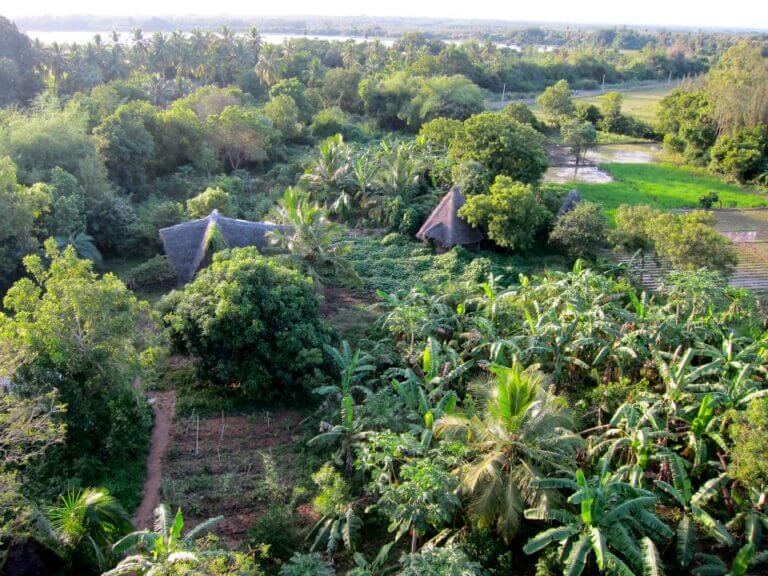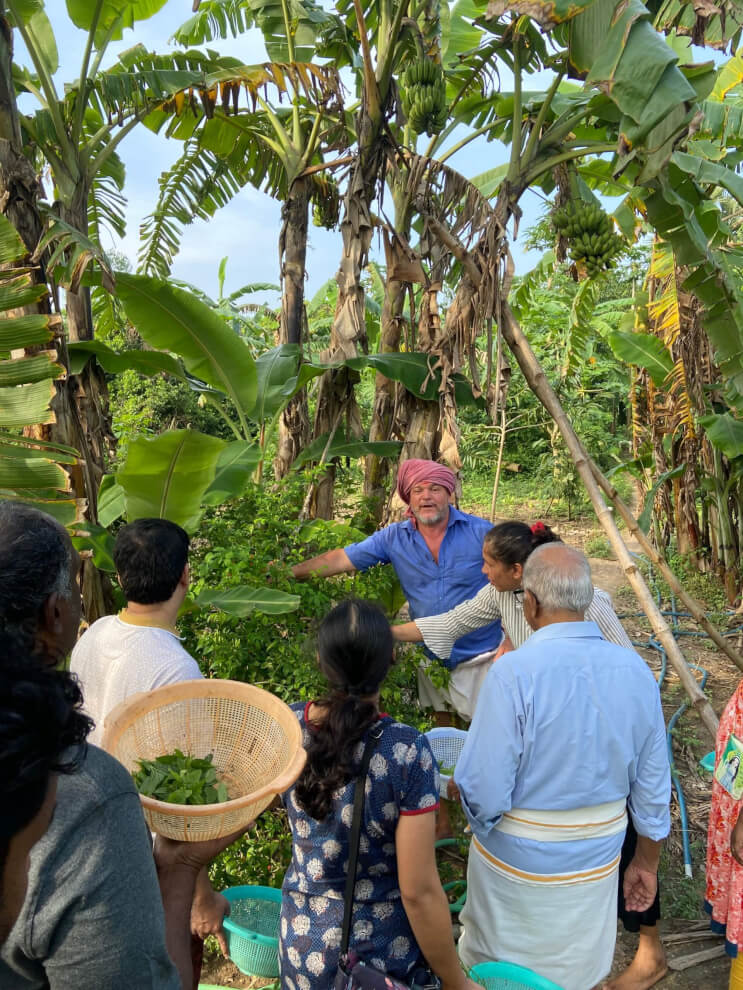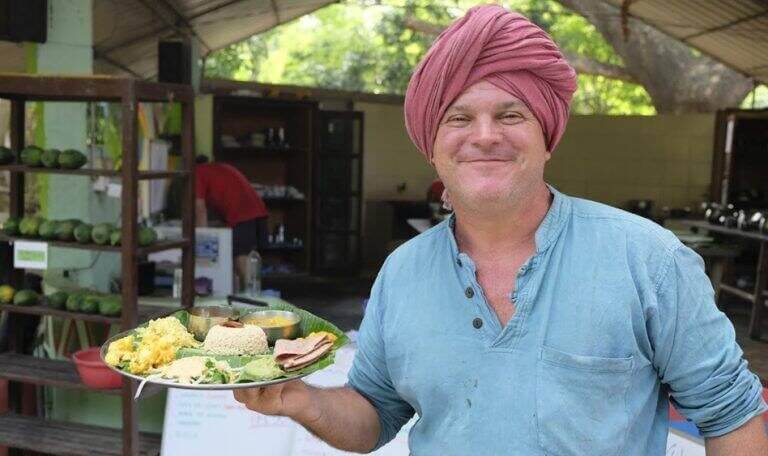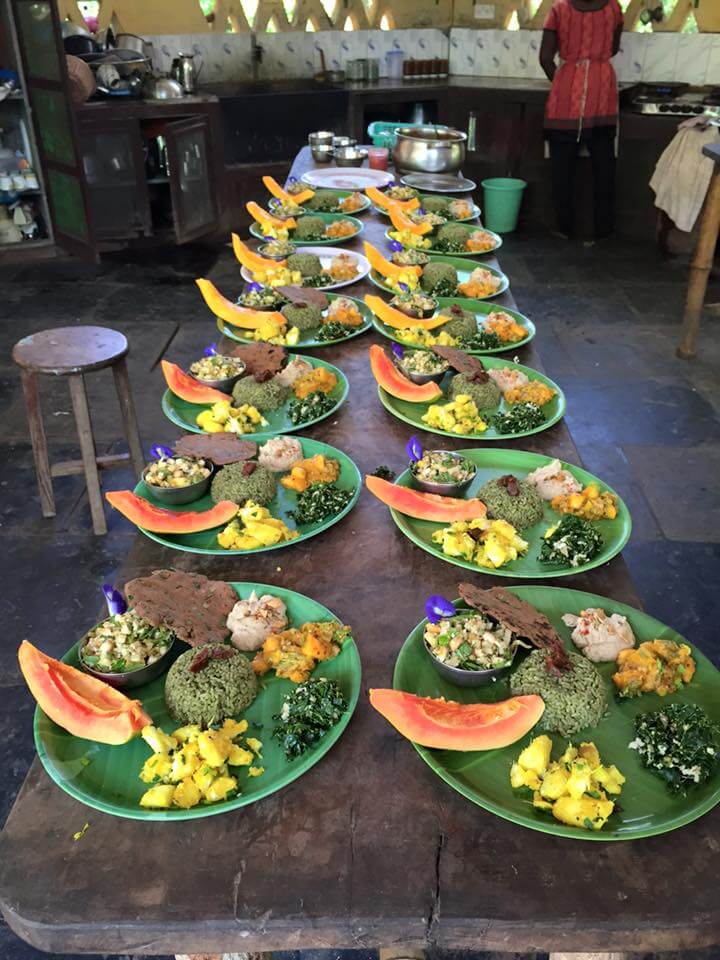Krishna McKenzie is a “Zen” farmer who is creating a unique concept in Auroville that is relevant everywhere in the world
At the impressionable age of sixteen, young Krishna Mckenzie was enrolled in the J Krishnamoorthy academy in the U.K. A year later, a wealthy philanthropist sponsored some of the students to visit all the four J Krishnamoorthy institutions in India—Chennai, Bengaluru, Benares, and Rishi Valley, and Krishna signed up for the trip.
The young Krishna, who considered himself a misfit in the English school, found himself fitting right in when he was in India. “I knew this country was my destination,” he recalls. After he went back to England, he met up with a gardener on the school grounds, who introduced him to the art of cultivation and producing food in a microcosm. “This gentleman had been to Auroville in the Seventies, and introduced me to the Mother, Shri Aurobindo, and the concept of Auroville, and to the concept of Yoga—where you can do something to discover yourself.”
It taught Krishna that this was a super sustainable lifestyle that didn’t need expensive art degrees, and would keep him connected to the real world—the community, culture, and cultivation pillars gave him the microcosm he was looking to belong to.
“At nineteen, I packed my bags, told my family that I was going to live in India, and began my long-winded sojourn through Afghanistan and Pakistan,” he reminisces. The young wannabe farmer had visions of buying a horse in the region and ride it into Auroville, but soon realized he was not interested in the travel, and really wanted to get to Auroville sooner than later.
Around this time, Krishna also discovered the work of Masanobu Fukuoka, “The One Straw Revolution,” a manifesto about farming, eating, and the limits of human knowledge that presents a radical challenge to the global systems we rely on for our food. At the same time, it is a spiritual memoir of a man whose innovative system of cultivating the earth reflects a deep faith in the wholeness and balance of the natural world.
“Fukuoka influenced my thinking and outlook on farming, and it clearly showed me the path I wanted to take,” says Krishna reverently. Arriving at Auroville—albeit a little circuitously through Benares, Kolhapure, and Bengaluru, Krishna was assigned to Annapoorna farms, started by a Dutch, who also followed the Fukuoka principles of farming. “For the first year, I spent my time as an intern—digging wells, milking cows, building rows, planting, and so on,” he recalls dreamily. “I had never worked so hard in my life, but I felt this wasn’t challenging me enough.”
Soon, he got an opportunity to work on his own property—about 50 acres of land an hour away from the Auroville campus, and he made his way there on his trusted, rickety bicycle. “I spent a year there, clearing out the granite pillars, starting a reforestation program, and trying to make the land a lot more friendly to farming.” It was like a Robinson Crusoe story—no electricity or utilities, far away from the comfort of Auroville, and a completely different world.
After about a year of giving it his all, Krishna decided to take a break, and went to Japan to meet up with his girlfriend, and convinced her to come back with him to work on the farm. Again, in a circuitous itinerary through Germany and England, the couple reached Auroville, only to discover someone else had moved into the farm. After some nerve-wracking social discussions, Krishna had the opportunity to begin what today is Solitude Farms. “By then, my girlfriend had decided that farming wasn’t her calling and decided to go back to Japan,” he laughs.

The restless Krishna parked his endeavors and went off to Europe, recording his first album in Paris, then learning Vipassana in Germany, and trying his hand at numerous other projects. In early 2000s, it dawned on him that he was spending cycles on projects that weren’t really going anywhere, all the while when this incredible canvas called Auroville was waiting for him to return and make something out of his life vision.
He returned to Auroville and initiated a “recapitulation” session for himself—listing everything he was grateful for, and found Solitude Farms was still available to him. Serendipitously, Masanobu Fukuoka was visiting India, and Krishna made all speed to meet his inspiration. “If that wasn’t my universe calling, I don’t know what is,” he recalls. “I had no money, no place to stay, no idea how it would all work out—but I knew I had to meet him.” Friends and networks threw a support ring together for Krishna, and he made it to Dehradun to spend the five days with Fukuoka.
A re-energized Krishna returned to Auroville to restart Solitude Farms. “My time with the guru crystalized my vision for the farm—we are the food we eat, and we should treat our land and nature as the gift baskets intended for us—not the other way around.”
Today Solitude Farms is a delightful landscape of permaculture cultivation that celebrates the land and its natural resources. “We manifested our belief in the bounty of Mother Nature by starting the Solitude Organic Café where we serve food made from the plants, weeds, and grains that grow in abundance around us,” says Krishna. He and his wife, Deepa, have been instrumental in showcasing the “food-as-medicine” to all visitors, and hold frequent workshops to demonstrate permaculture concepts.
By eating locally grown food is honoring the culture of that land. “Look at the bounty—the colors, the variety, and the beneficial aspect of Nature’s gift to this microcosm,” invites Krishna. “The palm fruit, the horse millet, the local flora all are so generous to the weather and conditions of just this small town. But we ignore all this and go gorge on a pizza or a meal made up of white rice and potatoes—none of which are local to this land or are beneficial.”
Solitude Farm launched an initiative to give food baskets to the local villagers, for as little as 100 Rupees, and after the first few weeks of great interest, Krishna found the village women didn’t return for more. “Their families wanted carrots and beans and other vegetables that are not local,” he says ruefully. “Ask your grandmother or grandfather—they probably never ate a meal of anything more than a porridge made of local grains, and a stew of the local roots and vegetables that grew on their farms.”
The health benefits of locally grown food is not lost on the visitors. Many excitedly share how their health had improved after changing their diets and food ingredients. “Someone’s blood pressure has dropped to normal; a diabetic’s sugar is under control; many have lost weight—it amazes me when they all come back and recount these stories.”
With his ever-handy guitar, Krishna is quick to belt out a song, create an impromptu jam session, and bring people together to celebrate. “Humans are joyful creatures—by getting back to their culture, community, and cultivating what Mother Nature offers generously, each of us can live in a happy state of plenty,” he says, “we just need to find that balance, and quickly.”









